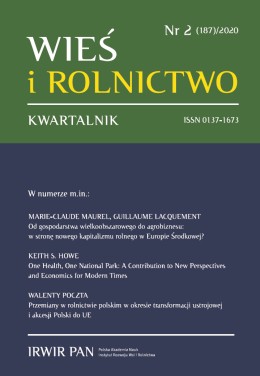One Health, One National Park: A Contribution to New Perspectives and Economics for Modern Times („Jedno Zdrowie”, jeden park narodowy: przyczynek do nowych perspektyw i gospodarki na nowe czasy)
DOI:
https://doi.org/10.53098/wir022020/02Słowa kluczowe:
„Jedno Zdrowie” (One Health), systemy, ryzyko, zasoby „łagodzące”, borelioza, martwica z Alabamy, zołzy, gruźlica bydła, Park Narodowy New Forest, AngliaAbstrakt
„Jedno Zdrowie” (One Health) to koncepcja, która postrzega zdrowie ludzi, zwierząt i środowiska przyrodniczego jako elementy jednego, współzależnego systemu. Pandemia Covid-19, której konsekwencje wykraczają daleko poza bezpośredni wpływ koronawirusa na zdrowie ludzi, uprzytamnia znaczenie tego coraz bardziej wpływowego ujęcia. W praktyce, „Jedno Zdrowie” ma swoje korzenie w dawnym powiązaniu nauk o zdrowiu ludzi i zdrowiu zwierząt. Z biegiem czasu każda sfera badań ewoluowała, wypracowując własne podejścia, metodologię i pytania badawcze. Ostatnio naukowcy z dziedziny weterynarii doprowadzili do reintegracji, rozszerzenia i promocji nauk o „Jednym Zdrowiu” w celu rozwiązania współczesnych problemów, w których zdrowie i ogólny dobrobyt nie byłyby postrzegane rozłącznie. Warunkiem wstępnym jest określenie ram pojęciowych i zasad umożliwiających jasne zdefiniowanie problemów, wzajemnych powiązań, a także poziomu agregacji odpowiedniego dla prowadzenia analizy ilościowej. Niniejszy artykuł poszerza te ramy poprzez uwzględnienie kompromisów gospodarczych, które w sposób nieunikniony muszą zostać osiągnięte w podsystemach ludzkim, zwierzęcym i przyrodniczym, oraz konsekwencji, jakie wiążą się z nałożeniem na nie interwencji politycznych. Park Narodowy New Forest w południowej Anglii to przypadek, w którym przyjęcie takiej perspektywy jest niezbędne. Zgodnie z definicją „Jednego Zdrowia” stosowaną przez Stone Mountain, w artykule przyjęto w pierwszej kolejności tradycyjne podejście łączące zdrowie ludzi i zwierząt. Borelioza, martwica z Alabamy, gruźlica bydła i zołzy to przykłady chorób stanowiących istotny problem. Główny nacisk należy położyć na znalezienie możliwości społecznie efektywnej redukcji ryzyka w odpowiedzi na zużycie „łagodzących” zasobów. Do podsystemów wypasowego chowu zwierząt gospodarskich przydzielane są płatności wspierające rolników użytkujących grunty wspólnot. Zachęty finansowe, będące faktycznie płatnościami od pogłowia, spowodowały tak duży wzrost inwentarza zwierząt, że szeroko pojęte środowisko przyrodnicze może w konsekwencji podlegać niekorzystnym efektom ubocznym zasługującym na osobne badanie.
Bibliografia
Animal & Plant Health Agency (2019). Year End Descriptive Epidemiology Report: Bovine TB Epidemic in the England Edge Area. Delivery Area: Southern, Name of County: Hampshire. Year-end report for: 2018. TR398 (Rev. 08/19) Department for Environment, Food and Rural Affairs
Baumeister R.F., Bratslavsky E., Finkenauer C., Vohs K.D. (2001). Bad is stronger than good. Review of General Psychology, 5, 323–370. DOI: https://doi.org/10.1037/1089-2680.5.4.323
Buchan K., Collins F. (2020). The Tree Surgery. Broadleaf, the Woodland Trust, No 101, Summer, 19–23.
Cumming D.H.M., Cumming G.S. (2015). One Health: an Ecological and Conservation Perspective. In Zinsstag et al. (op. cit.) Chapter 4, 38–52. DOI: https://doi.org/10.1079/9781780643410.0038
Deem S.L., Lane-deGraaf K.E., Rayhel E.A. (2019). Introduction to One Health: An Interdisciplinary Approach to Planetary Health. Wiley-Blackwell.
Dixon M.A., Dar O.A., Heymann D.L. (2014). Emerging infectious diseases: opportunities at the human-animal-environment interface. Veterinary Record, 174 (22), 546–551. DOI: https://doi.org/10.1136/vr.g3263
Drummond M.F., Sculpher M.J., Claxton K., Stoddart G.L., Torrance G.W. (2015). Methods for the Economic Evaluation of Health Care Programmes. Fourth edition. Oxford: Oxford University Press.
Environment Act (1995), http://www.legislation.gov.uk/ukpga/1995/25/contents (accessed: June 2020).
Gibbs E.P.J. (2014). The evolution of One Health: a decade of progress and challenges for the future. Veterinary Record, 174 (4), 85–91. DOI: https://doi.org/10.1136/vr.g143
Glover J. (2019). Landscapes Review: Final report, Chapter 3. https://www.gov.uk/government/publications/designated-landscapes-national-parks-and-aonb (accessed: June 2020).
Godfray C., Donnelly C., Hewinson G., Winter M., Wood J. (2018). Bovine TB Strategy Review. Report to Rt Hon Michael Gove MP, Secretary of State, Defra. October.
Harrison S., Kivuti-Bitok L., Macmillan A., Priest P. (2019). EcoHealth and One Health: A theory-focused review in response to calls for convergence. Environment Internation al, 132, 105058. DOI: https://doi.org/10.1016/j.envint.2019.105058
HM Government (2018). A Green Future: Our 25 Year Plan to Improve the Environment. https://assets.publishing.service.gov.uk/government/uploads/system/uploads/attachmet_data/file/693158/25-year-environment-plan.pdf (accessed: June 2020).
Howe K.S. (2018). Contesting the Commons: Economics and Politics in the New Forest National Park of Southern England. Wieś i Rolnictwo, 179 (2), 85–112. DOI: https://doi.org/10.53098/wir022018/05
Independent Scientific Group on Cattle TB (2007). Bovine TB: The Scientific Evidence. Final Report.
Kahneman D., Tversky A. (1979). Prospect theory: An analysis of decision under risk. Econometrica, 47, 263–291. DOI: https://doi.org/10.2307/1914185
King Sir D. (2007). Bovine Tuberculosis in Cattle and Badgers. A Report by the Chief Scientific Adviser to the Secretary of State, Department of the Environment, Food, and Rural Affairs.
McGraw A.P., Larsen J.T., Kahneman D., Schkade D. (2010). Comparing gains and losses. Psychological Science, 21, 1438–1445. DOI: https://doi.org/10.1177/0956797610381504
National Parks and Access to the Countryside Act 1949. http://www.legislation.gov.uk/ukpga/1949/97/pdfs/ukpga_19490097_en.pdf (accessed: June 2020).
Oura C. (2014). A One Health approach to the control of zoonotic vector-borne pathogens. Veterinary Record, 174 (16), 398–402 DOI: https://doi.org/10.1136/vr.g2539
Public Health England and National Parks England (2017). An Accord between National Parks and Public Health England to support joint action on improving health and well-being through our national parks. September, 6 pages.
RJS Associates Ltd. (2018). New Forest Recreation and Leisure Visits. Report commissioned by the New Forest National Park Authority on behalf of the Recreation Strategy Steering Group. October.
RSPB (Royal Society for the Protection of Birds) (2020). Recovering Together: A report of public opinion on the role and importance of nature during and in our recovery from the Coronavirus crisis in England. June. https://www.rspb.org.uk/globalassets/downloads/recovering-together-report/ (accessed: June 2020).
Rüegg S.R., Häsler B., Zinsstag J. (2018). Integrated Approaches to Health: A Handbook for the Evaluation of One Health. Wageningen Academic Publishers. DOI: https://doi.org/10.3920/978-90-8686-875-9
Stringer A. (2014). Improving animal health for poverty alleviation and sustainable livelihoods. Veterinary Record, 175 (3), 526–529. DOI: https://doi.org/10.1136/vr.g6281
Woods A.M., Bresalier M. (2014). One health, many histories. Veterinary Record, 174 (26), 650–665. DOI: https://doi.org/10.1136/vr.g3678
Woods A., Bresalier M., Cassidy A., Dentinger R.M. (2018). Animals and the Shaping of Modern Medicine: One Health and its Histories. Medicine and Biomedical Sciences in Modern History. Palgrave Macmillan. DOI: https://doi.org/10.1007/978-3-319-64337-3
Yechiam E., Hochman G. (2013). Losses as modulators of attention: Review and analysis of the unique effects of losses over gains. Psychological Bulletin, 139, 497–518. DOI: https://doi.org/10.1037/a0029383
Zinsstag J., Schelling E., Waltner-Toews D., Whittaker M., Tanner M. (2015). One Health: The Theory and Practice of Integrated Health Approaches. CABI International. DOI: https://doi.org/10.1079/9781780643410.0000











